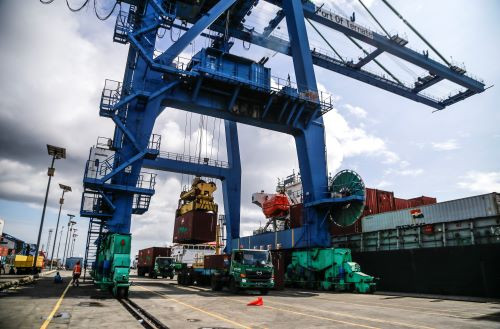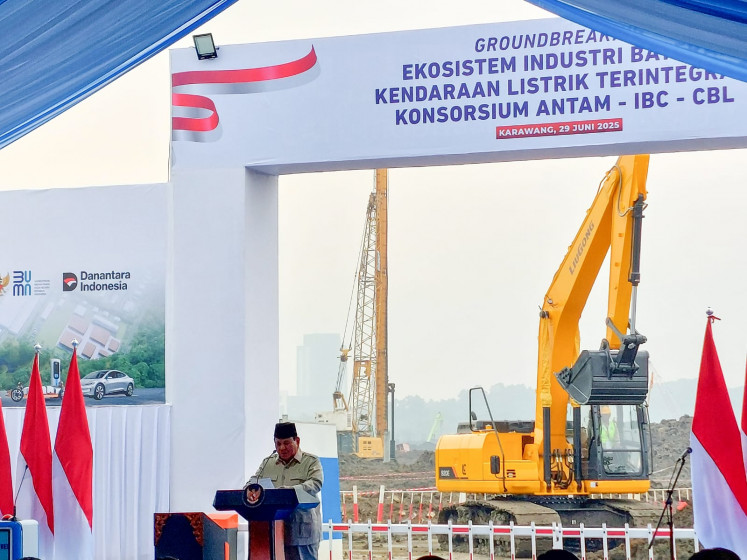Popular Reads
Top Results
Can't find what you're looking for?
View all search resultsPopular Reads
Top Results
Can't find what you're looking for?
View all search resultsInsight: Indonesian Police ' how much further will they go adrift?
When, on the occasion of the National Policeâs 69th anniversary on July 1, President Joko âJokowiâ Widodo strongly demanded institutional reform â which the force has always promised â it seemed as though he was preaching his sermon to the air
Change text size
Gift Premium Articles
to Anyone

W
hen, on the occasion of the National Police's 69th anniversary on July 1, President Joko 'Jokowi' Widodo strongly demanded institutional reform ' which the force has always promised ' it seemed as though he was preaching his sermon to the air. Surely he must be aware that the same promise has been uttered countless times by most police chiefs and officers.
But by now, thoughtful citizens are familiar with the fact that the promise has been turned, time and again, into little more than slogans, coupled with a penchant for answering the question of the factual by citing the normative. In a way, it is not too far-fetched to say that the police's institutional conduct is endured rather than embraced by ordinary citizens
That the issue of corruption featured prominently in the President's speech on the urgency of the police's institutional reform should not surprise anyone. Even police chief Gen. Badrodin Haiti was reported to have been aware of the rampant corruption within the force. Indeed, this venal character seems so habitual and entrenched that the force can hardly accept reform without mourning what is lost. And it hurts, if because what must be lost all kinds of privilege associated with the institutional venality.
This, to call the problem by its name, is what seems to be at the heart of the force's resistance against genuine reform. What they did in the recent standoff against the Corruption Eradication Commission (KPK) was a spectacle both ridiculous and pathetic, and it was symptomatic of this problem. Why not make the reform inevitable by means of legal necessity?
This is stating the obvious. But it does not help, for in this country law in the hand of it's legal enforcer is as malleable as a rubber band.
Surely this difficulty does not excuse the force from the urgency of reform. But why is police institutional reform so pressing? In a nutshell, it has all to do with the idea of a modern nation and its statecraft.
There is nothing distinctively Indonesian about this pressing urgency. Like all modern nation-states, Indonesia is an ongoing idea of the Westphalian model of polity based on the so-called 'police state'. The term may have assumed a pejorative meaning in today's political parlance, but its conception had nothing to do with the draconian rule now associated with it.
For those familiar with the history of political ideas, even the term 'police' itself directly originated from polis, the Greek name for city-state. In the wake of the collapsing imperial dreams that led to the Westphalia Treaty (1648), the idea of a modern raison d'Ãtat based on national sovereignty was emerging. The police were an institutional instrument for effectively integrating the activity of population-citizens into the state insofar as this activity constitutes the formation of a socio-political order. This is the original meaning of what was in German called Polizeistaat (police state).
Of course, these 17th- and 18th -century origins went through continuous modification. But the contemporary idea of the police as the guardian of public order is not far removed from what gave rise to the modern statecraft. In many respects the police have always been key to the formation of bio-politics, the management of human lives into a political order.
While being prevented from any control over the affairs of justice, finance and army, it is clear that the police have been vested with vast authorities over the bio-politics of living together in a civilized polity, not just immediate survival or not dying. The police were originally an institutional instrument to ensure that the nation is healthy and thriving vis-Ã -vis other nations in the post-Westphalian international competition. But, with or without inter-state competition, it was then taken in itself as one of the most central civilizing forces to ensure collectivities or crowds evolve into a political community.
To remind the Indonesian police of this noble task has some virtue but, as always, it is like having important conversations that will fall only on deaf ears. No doubt there are few exceptions to the rule, but most members of this force have a habit of acting like slaves before the political grandees and oligarchs but behaving like masters in front of the weak.
The omen is unpropitious and the ongoing symptoms point to an alarming tendency in which the police's privileged position will be turned further into a weapon to lord over the entire society. That this is unacceptable is a matter of course. The problem is, just because something is unacceptable does not mean that it will not happen. All this may sound grudging, and we may be accused of being heinous for thinking ill of our own police. But I bet that we get it right.
The way ahead for police reform does not seem reassuring, even for the optimists. If legal avenues are easily diverted by the force, popular pressure is not entirely convincing either. We hope that if we shout loudly enough, police officers will hear. Of course some do, but time and again most officers are stone deaf. Perhaps they find the democratic process too time consuming and ineffective compared with batons, guns and money.
But public reasoning, argument, legal means and the democratic process are the only vehicles of transformation fit for civilized life. If our police no longer believe in this civilized way of reform, they will never win the public's trust. They must be the wrong police on the wrong side at the wrong time.
________________
The writer is a postgraduate program lecturer at the Driyarkara School of Philosophy, Jakarta.









